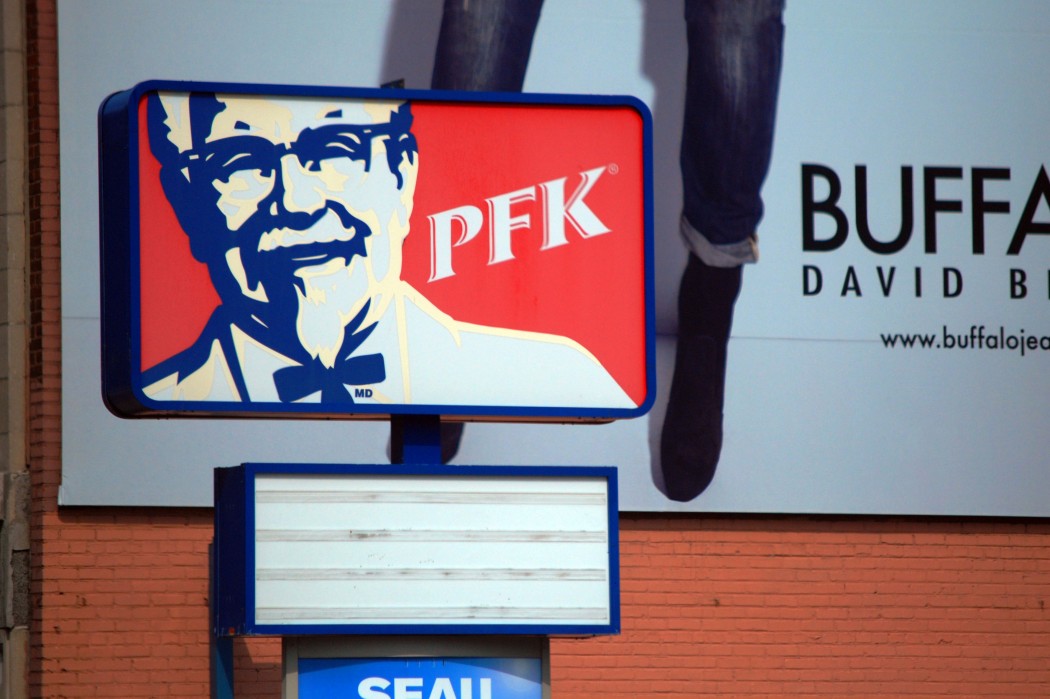Newcomers to Quebec are often bemused when they see Colonel Sanders next to the acronym “PFK”, instead of “KFC”. This befuddling french corporate signage has its roots in a 1977 bill known as Bill 101, or Loi 101. This bill, also known as the Charter of the French Language, was passed by Réne Lévesque and his Quebec nationalist government to promote and expand the French language. Often lost in the linguistic-cultural debates, though, is the negative impact this piece of legislation has had on Quebec’s economy.
But first, a brief history lesson. In 1968, the Montreal suburb of St. Leonard plunged into a linguistic debate when the school board attempted to make schooling French-only, which incensed the English minority population to vocally protest. This prompted the passage of Bill 63, which allowed parents to select the school they sent their children to and asked school boards to accommodate community demands. In the face of an expanding commercialized Anglophone culture, this relatively conciliatory bill was seen as a threat to Francophone culture. The resulting backlash from Francophone Quebecers caused the emergence of Bill 22, which made French the official language of public administration. Seeking to address further French language deficiencies in education and private business, Québécois nationalists ushered in Bill 101 in 1977.
Bill 101 enforces strict requirements on all businesses operating in the province. These include provisions that mandate all advertising be in French, requirements that menus be predominantly in French, and even regulations forcing businesses to change their names to French. The strictest requirements exist for businesses with over 50 employees. These firms are forced to conduct internal affairs in French, buy French-language software, and file with the Quebec government to demonstrate a commitment to the French language. Established businesses are thus immediately faced with high costs upon entering the Quebec market. moreover, small businesses seeking to expand are hampered by the 50-employee threshold and the set of regulations that come with surpassing it. Investing in new software, training, and employees adds up in price. Calculations show that every year, businesses spend over $35 million just filling out paperwork. Purchasing software, translating business materials, and retraining workers are not included in this figure. Perhaps this prohibitive cost can explain the notable lack of certain restaurants, such as Chipotle (McGill’s favourite April Fool’s joke), in the province. Bill 101’s current requirements hold business back and stifle growth.
While resources exist to help facilitate the transition, the Parti Quebecois (PQ) has recently sought to expand Bill 101’s punitive 50-employee business requirements to cover all businesses with over 11 employees. The effects of such an expansion would destroy small businesses across Quebec by forcing them to incur costs they cannot afford. Canada’s Federation of Independent Business, which represents small businesses all across the country, came out against the PQ’s proposed expansion. The PQ seemed to drop this idea once in power thanks to controversy, but their new leader, Jean-Francois Lisee, is promising to bolster Bill 101. Make no mistake, an expansion of Bill 101’s language requirements would prove detrimental to the province of Quebec.
Perhaps the most harrowing economic impact of Bill 101, however, is the maintenance of a language police in the province. If anybody believes a business is acting in violation of Bill 101, they can file a complaint with the Office québécois de la langue française (OQLF), which will then promptly investigate and rectify the infraction. There are 2,000 to 4,000 complaints annually registered with the OQLF, each of which can lead to fines of up to $1500. These complaints often become materialized in threatening letters, such as this one sent to a Quebec City restaurant which had failed to translate the words “Grilled Cheese”. Another ridiculous example, known as Pastagate, occurred at popular Montreal club Buonanotte, where the OQLF demanded that terms on the menu like “pasta” be changed. This incident especially highlighted the overzealousness of Bill 101’s enforcement and collectively embarrassed Quebec. Bill 101 has successfully created a government bureaucracy that punishes businesses for trivial violations, discouraging business owners from expanding into the province.
Even online retailers have not been spared the rod. In 2014, the OQLF required three multinational retailers to block access to their English websites due to complaints from a few members of the public. Their supposed violation? Any company operating a physical location in Quebec must have a French website. Even if a business opens one location in a majority Anglophone community like Montreal’s West Island, Bill 101 and the OQLF will ensure compliance with language regulations.
The situation is not ameliorating, even under the Philippe Couillard-led Liberal Party government that professes to stand on the side of Anglophones and ethnic minorities. In fact, it is getting worse. This spring, discussions emerged about the government’s newly proposed language law to require multinational giants to change illuminated signage. Estimates note a cost of $5000-$9000 for every store to make the necessary changes. Retailers with multiple stores in Quebec could be forced to shell out hundreds of thousands of dollars – or face the threat of punitive fines.
Despite its good intentions to protect the French language, Bill 101 unnecessarily burdens businesses with huge costs. Without delving into the impact Bill 101 has on Quebec’s education system, the adverse economic effects should be enough to provoke opposition to it, which has been notably absent from the political discourse in Quebec. It’s time for elected leaders to rise up and declare their opposition to Bill 101’s regulations. The words “Grilled Cheese” and “Pasta” do not pose a threat to Quebec’s culture.








